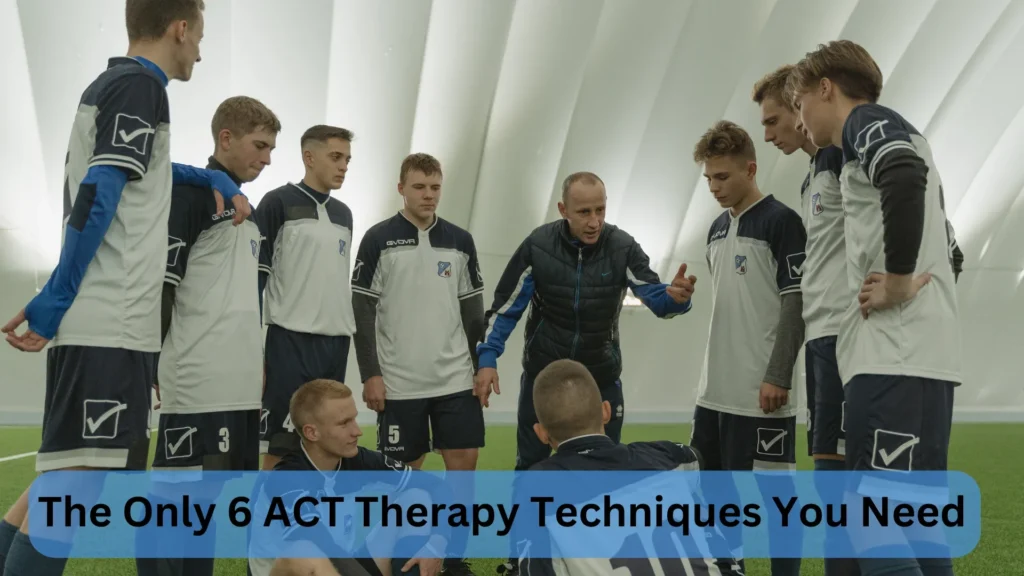
Today we’re talking about ACT Therapy Techniques, as one of the most impactful tools I’ve found is Acceptance and Commitment Therapy, or ACT.
As a sports psychologist, I’m always on the lookout for effective methods to help athletes maximize their potential.
If you’re not familiar with it yet, buckle up, because ACT is a game-changer.
What is ACT Therapy?
So, what’s ACT Therapy all about? In a nutshell, ACT stands for Acceptance and Commitment Therapy.
It’s a form of psychotherapy that helps people accept what’s out of their control and commit to action that improves their lives.
It was developed in the late 20th century and is grounded in mindfulness and behavioral change strategies.
ACT is built on six core principles: Acceptance, Cognitive Defusion, Being Present, Self as Context, Values, and Committed Action.
These might sound like big, fancy terms, but they’re all about helping you handle life’s challenges in a healthier, more effective way.
And for athletes, these principles can translate directly into better performance and well-being.
If you want to know more about what Acceptance and Commitment Therapy is, read this article where I’ve explained it in more depth: What is Acceptance and Commitment Therapy from a Sports Psychologist’s Perspective
But today, we’re talking about specific ACT techniques and how to apply these in training and real life.
ACT Therapy Techniques You Need
Alright, let’s dive deeper into the ACT techniques.
Here are the essential tools that every athlete should have in their mental toolkit, explained in more detail to help you understand their significance and application.
Cognitive Defusion
Cognitive defusion is all about changing how you relate to your thoughts.
Athletes often face negative self-talk that can undermine their confidence and performance.
Cognitive defusion techniques help you step back and observe your thoughts without getting caught up in them.
Technique:
- Observing Thoughts – Visualize your thoughts as leaves floating down a stream or clouds passing in the sky. This helps create distance between you and your thoughts, reducing their power over you.
- Using Metaphors – Metaphors like “I am not my thoughts” can reinforce the idea that thoughts are transient and not necessarily true.
- Changing Language – Instead of saying, “I am a failure,” try “I’m having the thought that I am a failure.” This simple change can help detach your identity from negative thoughts.
Acceptance
Acceptance means fully embracing your thoughts and feelings without trying to change or avoid them.
This can be particularly challenging but is essential for dealing with the inevitable stresses and pressures of competitive sports.
Technique:
- Mindfulness Exercises – Practicing mindfulness helps you stay present and accept your current experience without judgment.
Techniques like body scans or mindful breathing can anchor you in the moment.
- Allowing Feelings – When you feel anxiety or frustration, instead of fighting it, acknowledge it.
Saying “I accept that I’m feeling anxious right now” can reduce the struggle and help you move forward.
Being Present
Staying in the moment is crucial for peak performance.
Being present means fully engaging with what you are doing right now, without getting distracted by past mistakes or future worries.
Technique:
- Mindfulness Meditation – Regular meditation practice can enhance your ability to stay focused. Simple breath awareness exercises can be a great starting point.
- Grounding Exercises – When you feel overwhelmed, grounding exercises can bring you back to the present. Focus on your senses—notice what you see, hear, feel, taste, and smell.
Self as Context
This principle helps you see yourself as more than your thoughts, feelings, or roles.
By developing a sense of self that is broader than your immediate experiences, you can foster resilience and self-compassion.
Technique:
- Perspective-Taking – Imagine observing yourself from an outsider’s perspective or think about how you would advise a friend in your situation.
This can help you detach from immediate emotional responses.
- Self-Compassion Practices – Treat yourself with the same kindness you would offer to a friend.
Techniques like writing a compassionate letter to yourself can reinforce this mindset.
Values Clarification
Knowing what truly matters to you can be a powerful motivator.
Values clarification involves identifying your core values and aligning your actions with them. This process can provide a sense of purpose and direction.
Technique:
- Values Assessment – Reflect on what’s most important to you in life and in sports.
What do you want to stand for?
This can guide your goals and actions.
- Reflection Exercises – Regularly take time to reflect on whether your actions align with your values.
This can keep you on track and motivated.
Committed Action
Finally, committed action is about taking steps towards your goals, guided by your values.
This means setting and achieving progressive goals that keep you moving forward.
Technique:
- Setting SMART Goals – Create goals that are Specific, Measurable, Achievable, Relevant, and Time-bound.
This structure helps ensure your goals are clear and attainable.
- Creating Action Plans – Break your goals into smaller, manageable steps.
This makes them less daunting and easier to achieve.
- Commitment Strategies – Use strategies like accountability partners or public commitments to stay on track with your goals.
By incorporating these ACT techniques into your mental training, you can enhance your resilience, focus, and overall performance.
They’re not just about dealing with problems; they’re about building a stronger, more adaptable mindset that can handle whatever comes your way in sports and in life.

How to Implement These ACT Therapy Techniques?
Let’s get practical. Here’s how you can use ACT techniques in your sports training and competitions. I’ll give you real examples to make it easy to understand.
Cognitive Defusion
Imagine you’re dealing with negative self-talk during a game.
Example: You keep thinking, “I’m going to mess up.”
By imagining these thoughts as leaves floating down a stream, you can see them as just thoughts, not truths.
Strategy: Name your thoughts (e.g., “Here’s the ‘I’m not good enough’ thought again”).
This helps you create distance from them and reduces their impact.
Acceptance in Action
Pre-competition anxiety is common. Instead of fighting it, try accepting it.
Example: Before a big game, you feel anxious.
Acknowledge the anxiety by saying, “I accept that I’m feeling anxious right now,” and then focus on your pre-game routine.
Strategy: Use deep, mindful breathing exercises to ground yourself and stay focused.
Being Present for Peak Performance
Staying focused during a crucial match can be tough. Mindfulness exercises can help.
Example:Your mind starts to wander during an important point.
Use grounding techniques, like focusing on the feel of the racket or the sound of the ball, to bring your attention back to the present.
Strategy: Create cues to remind you to stay present.
For example, every time you touch your water bottle, check in with your breath and surroundings.
Self as Context for Self-Improvement
If you’re in a performance slump, seeing your situation from a broader perspective can help.
Example: Feeling frustrated and self-critical during a slump?
Use perspective-taking exercises to see your situation as temporary and remind yourself that you’re a capable athlete.
Strategy: Spend a few minutes each day imagining you’re an observer of your own life.
What advice would you give yourself?
Clarifying Values to Boost Motivation
Struggling with motivation and burnout? Clarifying your values can reignite your passion.
Example: Reflect on why you started your sport.
By reconnecting with values like personal growth and teamwork, set new goals that align with these values.
Strategy: Keep a journal to reflect on your values and how your actions align with them.
This helps maintain focus and motivation.
Committed Action for Consistent Progress
Long-term success requires a plan. Committed action techniques help you set and achieve progressive goals.
Example: Set a goal to compete in a national championship.
Break it down into smaller steps, like improving specific skills and increasing stamina. Regularly check your progress.
Strategy: Partner with a teammate or coach to review your goals and progress regularly.
This accountability helps you stay committed and motivated.
By incorporating these ACT techniques into your daily training and competitions, you can build a stronger, more resilient mindset.
These tools help you manage stress, improve focus, and ensure your actions align with your values and goals.
Conclusion
ACT therapy offers powerful techniques that can transform not just your athletic performance, but your overall well-being.
By incorporating these methods into your mental training, you can handle stress better, stay focused, and achieve your goals with greater ease.
And if you’re looking to dive deeper into ACT techniques and really boost your performance, check out our Success Stories Membership.
This membership gives you access to exclusive training based on ACT therapy techniques, designed to help you reach high performance.
Join a community of like-minded athletes and start your journey towards mental and physical excellence today!


